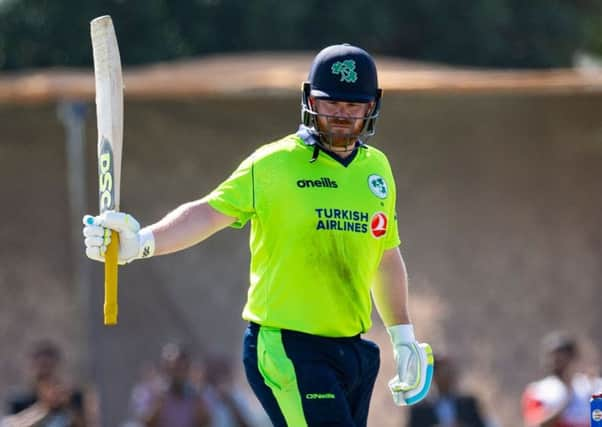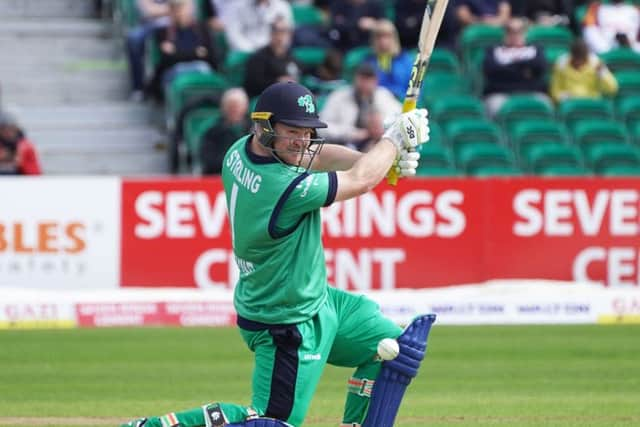Paul Stirling is a British citizen, he should fight his overseas tag for The Hundred


Born and raised in Northern Ireland, and a British citizen who has lived all of his life in the United Kingdom (including the last decade in London), Stirling will be one of those trying winning a lucrative contract in the new 2020 franchise competition.
However, Stirling has one major headache - he has been classified as an overseas player.
Advertisement
Hide AdAdvertisement
Hide AdEach of the eight franchises are limited to purchasing just three overseas players, and 29-year-old Stirling will be in a pot with world superstars like Steve Smith, Chris Gayle and David Warner.


The harsh reality is that franchises are probably unlikely to pick Stirling when they have so little room for manoeuvres on overseas players. However, you could bet your bottom dollar that he would have been readily snapped up had he still be classified as a local.
The writing has been on the wall for some time. Stirling, like international colleague Tim Murtagh, has been stuck between a rock and a hard place since the England and Wales Cricket Board (ECB) announced, controversially, in 2017 that Ireland players would be classified as overseas players from the 2020 season onwards unless they opted to declare for England.
That ECB ruling was at least a part influence in Warwickshire dispensing with the services of William Porterfield and Boyd Rankin who, like Stirling, are both British citizens born in Northern Ireland.
Advertisement
Hide AdAdvertisement
Hide AdPorterfield and Rankin were in the twilight of their county careers however, and an Irish central contract and occasional appearances in Ireland’s interprovincial competition probably were by no means a bad option for two men well into their thirties.
But it is different for Stirling. At 29 he remains very much in his prime and a blistering presence for Middlesex at the top of the order in limited overs cricket and in the middle order in the red ball game.
There had been no question of the hierarchy at Lord’s dispensing with his services. An emotional parting of ways in September came with the heaviest of hearts on both sides.
Stirling had been undecided for a long period about his next move and it’s no wonder. The razzmatazz of a Twenty20 Blast night in high summer in Lord’s in front of 30,000 won’t be easily replicated by a windswept Friday night at Belmont as he strides out to open for the Northern Knights against the North West Warriors.
Advertisement
Hide AdAdvertisement
Hide AdBut ultimately it came down to Stirling, a patriotic Irishman, still craving a place on the world stage, and the mouth-watering possibility of next year’s World Twenty20 in Australia and the next World Cup in four years’ time if Ireland qualify.
But the bottom line is that he should never have been put in such an invidious position and his employment opportunities restricted in such a prohibitive way.
A Northern Ireland-born sportsman declared an overseas player in an English league? Imagine the outcry if a similar fate had befallen Steven Davis or Jonny Evans.
The ECB’s guidelines would surely not stand up to legal scrutiny if this was pursued in the courts, especially in light of the ruling in the Emma De Souza citizenship case by judges at the start of this week. Anyone born in Northern Ireland is automatically British.
Advertisement
Hide AdAdvertisement
Hide AdStirling has sympathy in many high-profile places. Michael Atherton, the former England captain and now cricket correspondent for the Times, wrote the following on Thursday: “Paul Stirling’s sad situation as a British citizen unable to ply his trade in county cricket is recognised, as this Belfast-born Ireland cricketer must compete for selection from the overseas list.”
Is a legal challenge feasible? Stirling referred to such a possibility during an interview with The Daily Telegraph last month, and a prominent sports lawyer suggested in the summer that the ECB was potentially in contravention of employment law and open to a challenge under the UK’s Equality Act 2010 by differentiating between Northern Ireland and Scottish-born cricketers. The overseas classification, bizarrely, will not be applying to Scots who want to play in county cricket.
Of course, getting the likes of Stirling, Porterfield and Rankin back to these shores has suited Cricket Ireland too. The presence of such big names in the interpros will provide much-needed spark in a competition which, while providing hard-edged cricket, has largely failed to capture the public imagination, particularly north of the border. Stirling could yet bring a few more people through the gate.
But there is a major down-side too. Stirling, Porterfield, Rankin, Ed Joyce and Gary Wilson became better cricketers because of the English county game, and Ireland reaped the benefits. The county game now looks to be a non-runner for most Irish cricketers.
Advertisement
Hide AdAdvertisement
Hide AdLong term, the quality of the interprovincials must be robust, otherwise emerging players, and even well-established ones, will have little preparation for the jump up in class to international cricket.
Whatever your view on the nationality debate, The Hundred will be a poorer competition if there is no Stirling.